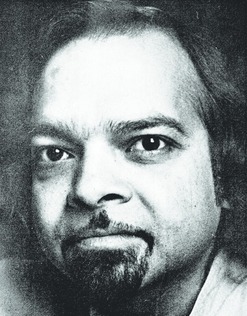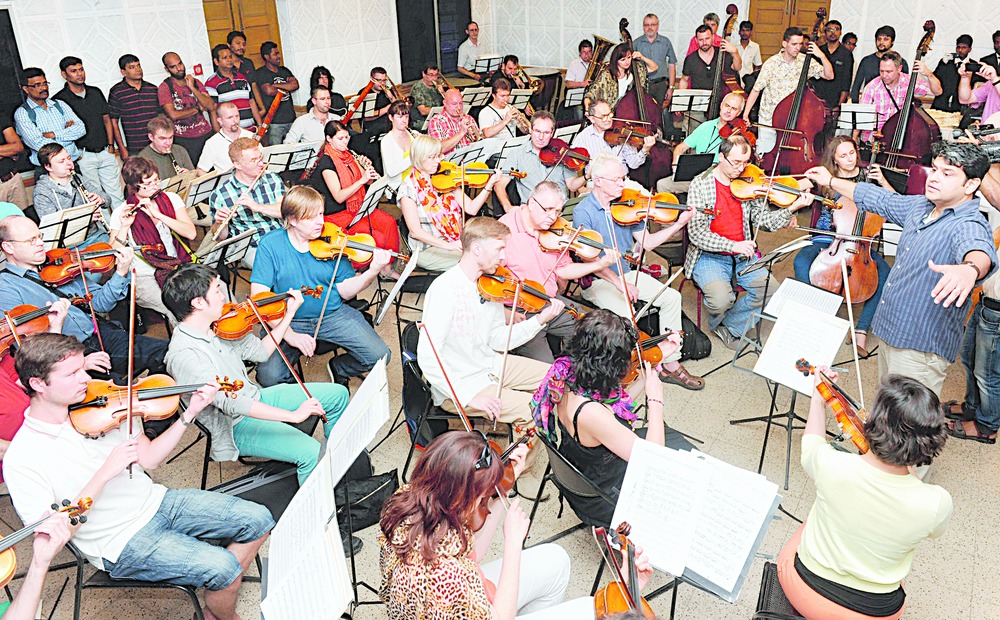by Sunanda K. Datta-Ray
Sasthi – I could never bring myself to use the contrived Brata surname – was dead long before he died. If publicity is oxygen for terrorists, Sasthi demanded recognition as a writer. Despite the impressive bravado, it must have killed him telling me on a visit to Calcutta that he sold air-conditioners in London and no longer thought of himself as a writer. Decades later Amitendu Bhattacharya of The Third Realm blog quoted him saying, “‘A Writer’ is one who writes, not someone who has written or is going to write.”
In a forgotten long ago Sasthibrata Chakravarti, to restore his birth name, blazed across Calcutta’s sky like a meteor driven by its own angry passions. What he had to say and the way he said it resonated with his peers. But he was dead in every sense when Pujitha Krishnan of Aleph Book Company approached me because M.J. Akbar wanted to include him in “a collection of India’s greatest journalism”. For a while I assumed whispers of his demise were greatly exaggerated. Sasthi once wrote his doctor had given him only six months. Another column poetically described the sunlight shining through the long golden hair of his (actually his partner’s by another mate) little daughter whose days were cruelly numbered. Sasthi survived those six months to pick fights with many men in many bars. He and his partner had gone their different ways before the little girl’s time was up. If, indeed, it was up and the whole thing wasn’t another self-advertising hoax.
Partha Sen at the Delhi School of Economics first mentioned his death. Bikash Sinha in Calcutta thought it likely. Revealingly, Amit Roy in London knew nothing. Sasthi never had time for London Bengalis. When Roy did confirm the news in this paper three weeks ago, he had it from a British actor. I had already seen – belatedly – The Third Realm’s bleak announcement of September 16, 2011, “I am sorry to tell you that Mr Sasthi Brata has recently been diagnosed with liver cancer. The doctors have given him 2 to 6 months time.” I posted a message and wasn’t surprised when it wasn’t acknowledged.
Sasthi left behind a scattering of meteorites. Some were novels disguised as autobiographies, some autobiographies were fiction. “All my fiction has been supremely autobiographical,” he boasted. Sasthi couldn’t get away from himself. That, as well as a gift for delivering unpleasant home truths in ringing prose, may partly explain why he was more talked about than read. Someone who organized a debate at Calcutta’s Park Hotel with Sasthi and Tilottama Mukherji, who became Shashi Tharoor’s first wife, as speakers, described how “a crude remark by Sasthi aimed at Tilottama caused a massive ruckus resulting in a substantial bill for crockery and furniture damage”. There were similar scenes in Delhi. The frontispiece of his first book, My God Died Young, showed Sasthi with a cigarette striking an Oscar Wilde pose. Confessions of an Indian Woman Eater was dedicated to 50 girls. He must have gloated on the Traitor to India phrase in another book’s title.
He was 21 when we met. I was nearly 23 and felt ancient against his exuberance. The fact that I had worked on newspapers in England for some years before joining The Statesman in London widened the gulf. Deb Kumar Das, busy packing his bags to follow a then unknown Gayatri Chakravorty to the new world, introduced us in the Olympia bar which nursed Left Bank pretensions in the Sixties. They had attended P. Lal’s Writers Workshop which published Sasthi’s Eleven Poems in Lal’s trademark saree binding. Sasthi had also briefly flirted with journalism: Philip Crosland of The Statesman discovered his genius when he was a shoeshine boy in Delhi. He had outgrown Writers Workshop and The Statesman. They languished in the mofussil. He would shine in London.
It was a brave decision. Sasthi had no contacts there but suffered from the Bengali obsession with London that has given Calcutta an imitation Big Ben. Brought up in middle class Entally, he grieved that “south of Park Street” was terra incognita. Like Nirad Chaudhuri, he invested cheese (which both discovered late in life) with cultural symbolism. But he refused to give the deference Chaudhuri expected. Sasthi was entitled to his pride. My God Died Young had just been published in London. He attacked me at the launch for wearing a three -piece suit. His chic friends wouldn’t approve. I explained I had come straight from covering a House of Lords debate. It made no difference. At dinner afterwards at L’Escargot restaurant in Soho he had a flaming row with Brenda (“but for whom the book would not have been possible” gushed the dedication) with whom he lived in Chelsea. “Throw him out,” urged her friends. “Just put his things on the doorstep…” The party threatened to split into camps. Sasthi spared me an uncomfortable choice. A few honeyed words and all acrimony vanished.
Bengali London, licking its wounds, was cock-a-hoop when a smart-alecky critic wrote Sasthi should hitch up his dhoti before attempting his next novel. But any comment by that reviewer, especially a long notice in a highly regarded Sunday paper, confirmed My God Died Young had made a mark. Those were early days for Indians in English fiction. G.V. Desani ( All About H. Hatterr) and Raja Rao (The Serpent and the Rope) had gone. Vikram Seth and Amitav Ghosh had not emerged. It filled Sasthi with frustrated fury that instead of being regarded as a mainstream English writer he floated in “Indo-Anglian” ambiguity. He was mightily offended when Brian Lapping, whom the Wall Street Journal called “the acme, the Rolls-Royce of documentary makers”, said he sounded like me. “He lumped us together as Indians!” Sasthi stormed. “It’s all right for you, you live in India. I am a Londoner. I can’t afford to be typecast.” He rebelled against the categorization as he had rebelled against his upbringing. So much resentment made him increasingly embarrassing company. Perhaps Sasthi himself saw the absurdity. “Well, you can’t be a rebel at seventy or near about seventy, can you?” he asked an interviewer. He was shooting a line even then. He was not “near about seventy”. He was 71.
Sasthi disappeared. His articles no longer appeared in any British newspaper. His column in The Statesman – I often wondered if he regarded it as a triumphant return to the world of letters or consolation prize for not making it in Fleet Street – had ended long ago. People didn’t want to know when I inquired about him on visits to London. He told The Third Realm he had been working for 20-25 years on a novel titled Damned by the Rainbow. I gathered he turned his hand to any job he could get – lavatory attendant, postman, kitchen porter – to supplement Britain’s state pension. Then, seeing his byline in Outlook, I found out his email address – email didn’t exist when we were in touch – and sent a welcome-back message. His instant reply ordered me to use my influence as editor of The Statesman to arrange two weeks’ free stay at the Oberoi Grand. I explained it would have been impossible to do that even if the paper and I hadn’t parted company 14 years before. How do you live then? he demanded. End of correspondence.
I hope he was at peace with himself at the end. “Rimbaud stopped writing poetry at nineteen… Jesus was crucified at thirty-three; Jack Kennedy was shot in Dallas at forty-six. I am twenty-nine years old. What have I done? What am I capable of doing? Who am I?” he asked in My God Died Young. Even if Sasthi had said everything he had to say, those questions reflected the eternal quest of a thinking mind. They deserved answers.
source: http://www.telegraphindia.com / The Telegraph,Calcutta,India / Front Page> Opinion> Story / by Sunanda K. Datta-Ray / Saturday – February 27th, 2016

